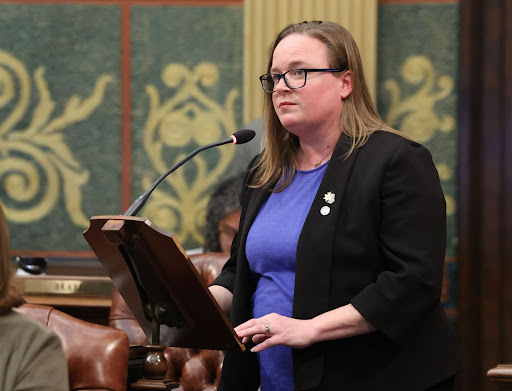Guardianship, conservatorship safeguards alongside protections for witness, survivors’ personal information legislation voted out with bipartisan support
LANSING, Mich., Oct. 25, 2023 — The Michigan House of Representatives passed two bill packages yesterday, each helping to protect Michiganders.
The first bill package, House Bills 4909-12 and HB 5047, amends guardian and conservator standards. Michigan’s most vulnerable people are not receiving the support and assistance they require. While most guardians and conservators work to protect their ward’s best interest, there are some who seek to exploit those who cannot adequately protect themselves.
Guardians and conservators are individuals appointed by the court to care for incapacitated adults, a person who the court system has deemed to have lost their ability to care for themselves properly. A guardian takes care of an incapacitated adult’s personal needs, while a conservator takes care of their property and finances.
“The dire need for reform for Michigan’s guardianship and conservatorship has continued for decades, unchanged,” said state Rep. Kelly Breen (D-Novi), chair of the House Judiciary Committee, leader on this bill package and sponsor of HB 4909. “By passing these bills, we have made a historic breakthrough for the protection and wellness of Michigan’s most vulnerable people. I work for the people of Michigan. I will tirelessly continue to support sensible legislation that ensures thoughtful implementation of changes and ensures best protection of Michiganders.”
In general, HBs 4909-12 would provide safeguards for the guardianship system, better outline processes and procedures in the courts, and offer guidance to family members. HB 5047 will create the Office of State Guardian within the Department of Health and Human Services.
Both the Attorney General’s Office and the Elder Abuse Task Force were in support of this package. More specifically, HB 4909 creates a factor for the court to consider if the conservator or guardian is suitable. HB 4910, sponsored by state Rep. Penelope Tsernoglou (D-East Lansing), revises Michigan law for a guardian ad litem’s duties and a guardian’s visitation duties. It also creates procedures for removing an individual from their permanent residence.
“These bills are really about making sure our laws are rightfully protecting those who can’t protect themselves,” Tsernoglou said. “My bill carefully lays down standards to ensure the protection and care of vulnerable adults. This legislation will make impactful changes in our probate courts. Many hours were dedicated to create these carefully considered precedents.”
This bill package has bipartisan support. HB 4911, sponsored by state Rep. Graham Filler (R-Clinton County), will change the procedures for an initial hearing on the issue of incapacity, examination by a physician or mental health professional, and for appointing an emergency guardian. HB 4912, introduced by state Rep. Ken Borton (R-Gaylord), amends the process for appointing a temporary guardian and removing a conservatorship.
The last bill in this package is HB 5047, sponsored by state Rep. Betsy Coffia (D-Traverse City), and creates the Office of State Guardian.
“Guardians and conservators have an immense responsibility, and my bill will provide for a specific state office to address questions and complaints,” Coffia said. “This office will ensure vulnerable adults have proper care. This bill also defines a whole slew of standards for the enrichment of guardians and conservators, while providing crucial information and educational opportunities.”
The second bill package the House passed, HBs 4738 and 4739, implement criminal safeguards to maintain the confidentiality and contact information of survivors and witnesses. Breen introduced HB 4738, and state Rep. Denise Mentzer (D-Mount Clemens) sponsored HB 4739.
“These bills are about protecting access to a survivor’s or witness’s personal contact information. Without this legislation, it’s harder to get victims and witnesses to come forward and file charges or participate in a legal proceeding because of the threat of retaliation or harm.” Mentzer said. “When both survivors and witnesses step up and speak out against injustice, these bills make sure there is a system in place to reduce the risk of revictimization or harassment. Voting out these bills says, ‘survivors matter, witnesses matter and their safety is our priority.”

